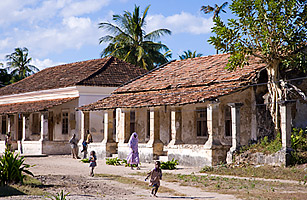
On the Mozambican island of Ibo, with its ruins of a vanished world, history lives
In a crowded world, few places are undiscovered, but once in a while some are forgotten. Ibo Island, in the 32-island Quirimbas Archipelago off the remote northeastern coast of Mozambique, is a genuine Lost City. A century ago it was a busy port on East Africa's Swahili coast, a settlement of Indian merchant houses, colonial Portuguese mansions, Chinese traders and 40,000 people, the last stop on a trade route running south from Mogadishu via Lamu, Mombasa and Zanzibar. Sailed for centuries by Portuguese and more than a millennium by Arabs, the route declined with the end of slavery, then sank into obscurity with colonialism's demise in 1975. Mombasa reinvented itself as a trade hub for East Africa, and Lamu and Zanzibar became holiday islands, but Ibo — small, remote, surrounded by mud flats — simply faded away. Today 3,500 people live in what is largely a ghost town. The three forts still stand, but the grand colonnades are crumbling, and the mansions built with fortunes from trading amber, ivory and turtle shell lie in ruins, trees bursting through their roofs while their gardens, overgrown with bougainvillea the color of ball gowns, still vainly boast of past glories.
Today the archipelago, called the Lazarus Islands by the Portuguese, is showing signs of new life as a tourist destination. It's hardly a rush — visitors will likely meet only a handful of other guests — but that's precisely the charm. You reach Ibo or the other Quirimbas islands by taking a small prop plane from the northern Mozambican town of Pemba and flying north over the turquoise shallows of the archipelago. The smaller islands consist of little more than an airstrip and one extremely expensive resort — beautiful, but you could be anywhere. Ibo, with its ruins of a vanished world staring out at an uninterrupted eastern horizon, is more specifically located. It is, unmistakably, the ends of the earth.
In this remote corner of the world, history lives. Wander the old lanes that run off the central Placa and you'll soon come across Joao Baptista, the local historian, who will likely tell you about Ibo and even show you around. One highlight, in between the mix of Indian, Chinese, Arab, European and African architecture, is a small, square colonial bungalow whose outer walls are decorated entirely with cowry shells. These stand as witness to a famous island tragedy. The house belonged to a Portuguese trader and his wife. He installed her there soon after they married, then took off to seek his fortune. He was away for years and for every day of his absence his wife would walk to the beach, pick up a cowry and stick it on the house. By the time he returned, the house was covered with thousands of shells. But this was no happy reunion. The husband had gone home because he was sick. Soon he died. After waiting for love for so long only for it to be in vain, something in his wife snapped. She refused to believe he was dead. For weeks, she took him food and drink as he lay on his deathbed. Eventually she was committed to an asylum.
Ibo abounds with stories whose power seem to make the past ever present. The delights of the present day ensure history is never overwhelming, however. You can take boat trips through some of the biggest mangroves in Africa, home to 700 bird species as well as the endangered dugong, or out into the open sea to snorkel on untouched coral reefs. All but unbeatable is a short sail in a dhow (a traditional Arab sailing vessel) to one of the pristine sand dunes that miraculously appear out of the Indian Ocean to the east of Ibo as the tide recedes. There your captain will plant an umbrella in the sand, set up a table and chairs in its shade, and furnish the top with a lobster and cool white South African wine. Lunch, at world's end.
There are three hotels in town, which between them suit most budgets: Miti Miwire (from $50 per room per night), Cinco Portas Pensão (from $100) and Ibo Island Lodge (from $335 per person per night). Each is housed in a former colonial mansion, and the price reflects the facilities. Miti Miwire is a charming, friendly guesthouse in one of the biggest buildings on Ibo. Cinco Portas has a pool, a great bar and a sea breeze with a view of the harbor. Ibo Island Lodge has huge rooms, Goan four-poster beds, the best pool and the best sunset view, and its rates include air transfers from the mainland, three high-end meals a day and use of a dhow. (See mitimiwiri.com, cincoportas.com and iboisland.com.)